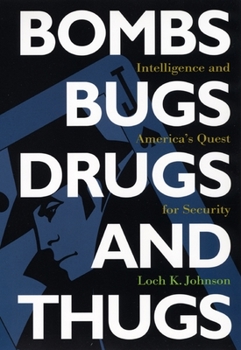Bombs, Bugs, Drugs, and Thugs: Intelligence and America's Quest for Security
Select Format
Select Condition 
Book Overview
An "experienced overseer of intelligence" maps out the future of American intelligence and security
Format:Paperback
Language:English
ISBN:081474253X
ISBN13:9780814742532
Release Date:April 2002
Publisher:New York University Press
Length:298 Pages
Weight:0.98 lbs.
Dimensions:0.8" x 6.1" x 9.0"
Customer Reviews
3 ratings
CIA Organization
Published by Thriftbooks.com User , 19 years ago
If you want to read a good book concerning needed CIA organizational changes, this is the one to read since it came out before 911. (Nov 1, 2000 in hardback). Chapter 5, "The DCI and the Eight-Hundred-Pound Gorilla" gives a very detailed accounting of the politics between the Department of Defense and the CIA. Books written after 911, including the 911 Commission Report either have too much blame or too little blame placed on politicians. Books written by democrats or republicans have too much blame and bi-partisan commissions have too little blame. Back to chapter 5. The Aspin-Brown Commission of 1996 had all the same major recommendations as the 911 Commission Report. Congress made a lot of changes in the way the National Security Council (NSC) and CIA are organized, but they did not make the DCI a cabinet level job. They added two subcommittees to the NSC including the Committee on Foreign Intelligence (CFI) and the Committee on Transnational Threats. The latter committee was meant to include global crime, narcotics flows, and weapons proliferation, as if the NSC had somehow overlooked these menaces in the past. The DCI was given four additional directors to help him oversee the Intelligence Community just as President Truman originally intended (the "C" in CIA means central). But the fatal flaw was the inability of the DCI to overrule the Department of Defense in determining budget responsibilities. The DCI was even given concurrence authority on director nominations of other intelligence agencies. The unanswered question is whether or not Presidents Clinton and Bush II failed to back their DCIs in this increased responsibility against other cabinet level jobs. If they had backed their DCIs to strengthen their control over the entire Intelligent Communities could it have prevented 911? Or is it necessary to have the proper job title to have prevented 911? Have we rewarded an agency that failed us or have we failed to supported a critical agency and give it's director a proper job title?
Nontraditional Intelligence Targets
Published by Thriftbooks.com User , 21 years ago
Loch Johnson's book serves as an excellent introduction to the type of problems that now face intelligence agencies i.e. problems caused by "non-state actors" like terrorists and drug runners as opposed to the traditional nation versus nation. For readers interested in the development of the intelligence business, this one is definitely worth a read. I used this book very successfully with college juniors and seniors in a course on intelligence.
Rare and Deep Insights into Intelligence Grid-Lock
Published by Thriftbooks.com User , 24 years ago
The opening quotation from Harry Howe Ransom says it all-"Certainly nothing is more rational and logical than the idea that national security policies be based upon the fullest and most accurate information available; but the cold war spawned an intelligence Frankenstein monster that now needs to be dissected, remodeled, rationalized and made fully accountable to responsible representatives of the people." Professor Johnson is one of only two people(the other being Britt Snider) to have served on both the Church Commission in the 1970's and the Aspin-Brown Commission in the 1990's, and is in my view one of the most competent observer and commentator on the so-called U.S. Intelligence Community. The book is a tour d'horizon on both the deficiencies of today's highly fragmented and bureaucratized archipelago of independent fiefdoms, as well as the "new intelligence agenda" that places public health and the environment near the top of the list of topics to be covered by spies and satellites. Highlights of this excellent work, a new standard in terms of currency and breadth, include his informed judgment that most of what is in the "base" budget of the community should be resurrected for reexamination, and that at least 20% of the budget (roughly $6 billion per year) could be done away with-and one speculates that this would be good news to an Administration actively seeking trade-offs permitting its promised tax cut program. His overviews of the various cultures within the Central Intelligence Agency, of the myths of intelligence, and of the possibilities for burden sharing all merit close review. He does, however, go a bridge too far while simultaneously rendering a great service to the incoming Administration. He properly identifies the dramatic shortfalls in the open source information gathering and processing capabilities of the various Departments of the Federal government-notably the Department of State as well as the Department of Commerce and the various agencies associated with public health-but then he goes on to suggest that these very incapacities should give rise to an extension of the U.S. Intelligence Community's mission and mandate-that it is the U.S. Intelligence Community, including clandestine case officers in the field and even FBI special agents, who should be tasked with collecting open sources of information and with reporting on everything from disease to pollution. This will never work, but it does highlight the fact that all is not well with *both* the U.S. Intelligence Community *and* the rest of the government that is purportedly responsible for collecting and understanding open sources of information. On balance I found this book to be a very competent, insightful, and well-documented survey of the current stresses and strains facing the U.S. national intelligence community. The conclusion that I drew from the book, one that might not be shared by the author, was that the U.S. Government as a whole has complete






